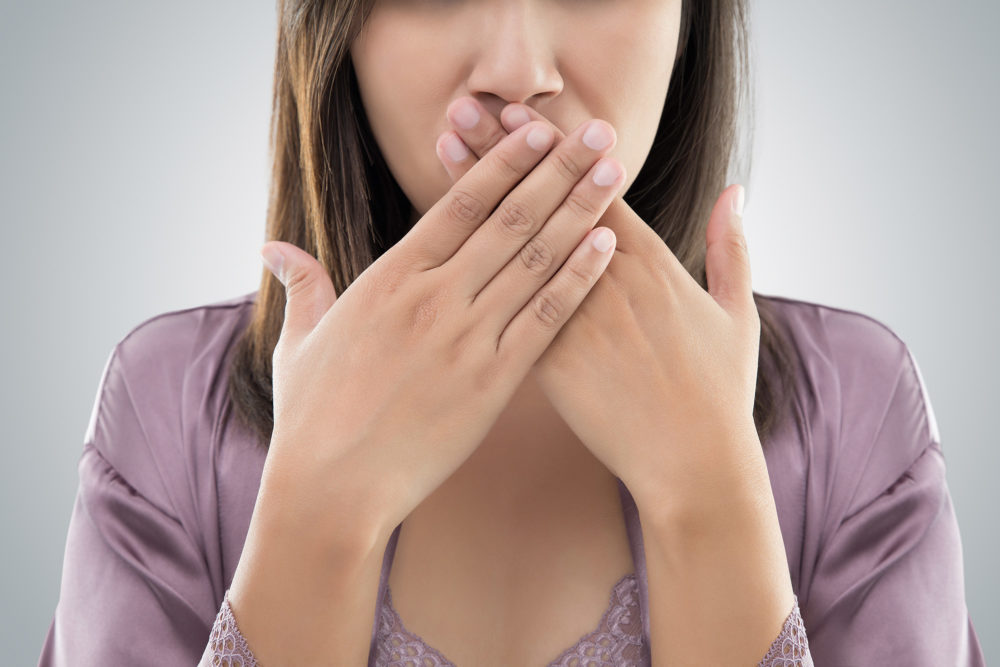
October 3, 2018
Halitosis
Halitosis is chronic bad breath. There can be several causes of halitosis, as well as options for treatment.
Causes of halitosis
The majority of halitosis begins in the mouth and is caused by overpopulation of certain types of bacteria. Fortunately, treatment of this type of halitosis is generally quite simple and effective. However in some cases, the issue goes beyond the oral cavity and can be more complicated to treat.
Bacterial plaque and food debris on the tongue and teeth
The tongue’s surface is extremely rough, and bacteria can accumulate easily in the cracks and crevices, particularly at the back of the tongue. Large amounts of sulfur compounds can be produced in this area, making it a frequent site of origin for bad breath. Teeth that are not cleaned regularly and thoroughly can also accumulate large amounts of bacteria. The bacteria feed on the protein in saliva and tissues, producing large amounts of volatile sulfur compounds (VSCs). It is generally these sulfur compounds that mix with air in the mouth to form bad breath.
Gingivitis or periodontal disease (gum disease)
Gingivitis or periodontal disease creates deep pockets around teeth, which are difficult to clean. As a result, people with these conditions often experience bad breath due to bacteria that accumulates in these areas. Read more about the causes, symptoms, and treatment of gum disease here.
Tonsilloliths
Tonsilloliths appears as cauliflower-like lumps in the pockets of the tonsils. These lumps are caused by a combination of bacteria, food debris, dead cells, and mucus that accumulates in these small pockets and is eventually forced out in small portions by the action of the throat muscles, accompanied by an unpleasant smell.
Tonsilloliths can be treated successfully with antimicrobial rinses such as chlorhexidine, or with a mixture of antibiotics. The number of lumps present and the size and the frequency with which they appear can all be reduced dramatically, but it is rare that they can be completely removed. With treatment, many patients only experience one or two very small lumps in a 4- to 6-month period.
Although surgical procedures are not recommended except when the tonsil appears enlarged, inflamed, and infected, a tonsillectomy (surgical removal of tonsils) is the most effective way to prevent the formation of tonsilloliths. Your doctor can advise you if a tonsillectomy should be considered.
Xerostomia (dry mouth)
There are many causes of xerostomia, and it can frequently cause halitosis. Read more about the causes of and treatments for xerostomia here.
Infections, diseases, and disorders
Some more complicated causes of halitosis are:
- infections, especially in the sinuses or lungs
- diabetes mellitus
- kidney failure
- gastrointestinal disorders
- malfunction of the liver
- hormonal problems and metabolic disorders
- stress
Fasting and extreme diets
When the body is not provided with the necessary fuel in the form of food, it will begin to break down fat and protein. This waste products produced by the metabolism of fat and protein results in a bad odour.
Extreme diets, such as the popular low-carb “keto diet,” can also cause bad breath.
Tobacco products, alcohol, and certain medications
These products can all cause chronic bad breath. See more about the harmful effects of smoking here.
Trimethylaminuria (TMAU) or fish-odour syndrome
Trimethylamine (TMA) is a byproduct formed when the body converts a nutrient called choline into essential compounds that are used by the nervous system and other body systems. TMA is excreted through all pores in the body, including the skin, mouth and nose, and when functioning normally, the body deodorizes this chemical naturally. However, in some people, the body fails to oxidize TMA, and this condition is called Trimethylaminuria or TMAU.
Treating halitosis
Because your oral cavity is connected to your nose, your body filters out background smells like your breath, which means you might not be able to detect your own halitosis. However, you could also experience halitophobia, which is an exaggerated and needless fear of bad breath. If you’re concerned that you may have halitosis, ask your dentist!
Diagnosis and treatment begins with a complete oral examination and health history. The cause of the halitosis will help to determine the path of treatment.
- Periodontal disease and/or cavities should be treated and repaired.
- Oral infections must be eliminated or impacted teeth may need to be removed.
- Good oral hygiene is a must, including cleaning the teeth and tongue.
- Mouthrinses, toothpastes, and other oral hygiene products may have some effectiveness in managing oral odour, as long as any underlying problems have been addressed.
If halitosis is the result of a more complicated health issue or medication, it’s important to discuss options with your dentist. You can book an appointment right here.